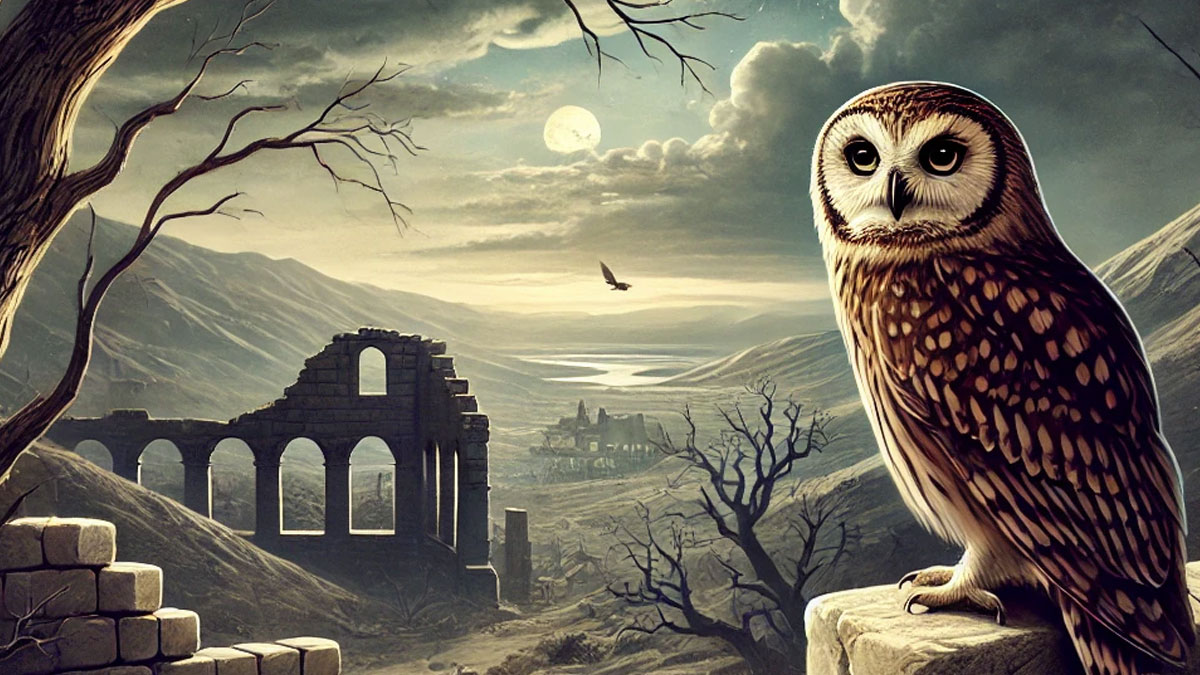Owls are birds of prey often associated with darkness and solitude, characteristics that contribute to their symbolic representation in religious and cultural texts. In the Bible, owls are mentioned several times, typically in passages that evoke themes of desolation, loneliness, and judgment. The symbolic use of owls in the Bible aligns with common ancient perceptions of owls as omens or creatures of mystery due to their nocturnal habits and haunting calls.
Symbolic Meaning of Owls in the Bible
In the biblical context, the owl is often depicted in association with desolate and uninhabited places. This portrayal likely stems from its behavior and appearance, which inspired metaphors of isolation and desolation in Hebrew scriptures. Owls are mentioned in descriptions of barren landscapes, forsaken cities, and abandoned places to emphasize themes of emptiness and divine judgment.
The ancient Israelites, like other cultures, viewed the owl as a symbol of mourning, ruin, and abandonment. This symbolism aligns with the natural traits of owls, including their nocturnal activity and their haunting calls, which resonated with themes of solitude and death.
Mentions of Owls in the Old Testament
In the Old Testament, owls are referenced in various books, including Leviticus, Deuteronomy, Job, Psalms, and Isaiah. These passages often use owls to emphasize God’s judgment or the aftermath of divine retribution. Below are some notable references to owls in these books:
- Leviticus and Deuteronomy – In the law codes of the Mosaic books (Leviticus 11:13-19 and Deuteronomy 14:16-18), the owl is listed among the “unclean” animals. These lists detail animals that are forbidden to be eaten, marking the owl as a creature to be avoided, which further enhances its symbolic association with impurity and separation from the divine.
- Book of Job – In Job 30:29, Job describes himself as “a brother to dragons, and a companion to owls,” suggesting that he feels abandoned and cut off from society. Here, the owl emphasizes Job’s isolation and despair as he undergoes intense suffering and wrestles with feelings of alienation from both God and man.
- Book of Psalms – In Psalm 102:6-7, the psalmist writes, “I am like a pelican of the wilderness: I am like an owl of the desert. I watch, and am as a sparrow alone upon the housetop.” The owl in this passage underscores themes of loneliness and desolation, reflecting the psalmist’s sense of abandonment and grief.
- Book of Isaiah – Isaiah 13:21-22 and Isaiah 34:11-15 describe deserted places inhabited by wild creatures, including owls, as signs of divine punishment. These passages prophesy judgment upon Babylon and Edom, portraying owls among other unclean animals that will occupy the lands after they have been destroyed. Owls here are symbols of divine wrath and the resulting desolation.
Interpretation and Significance of Owls in the Bible
In the Bible, owls are not viewed as creatures of wisdom as they are in many other cultures; instead, they embody desolation and spiritual abandonment. Their nocturnal nature aligns with themes of darkness and emptiness, often indicating places forsaken by people and sometimes by God. The symbolic portrayal of owls as ominous figures is consistent with broader ancient Middle Eastern beliefs, where owls were often seen as harbingers of doom or messengers of the supernatural.
Cultural and Religious Context of Owls in the Ancient Near East
Owls in ancient Hebrew culture, as well as in the neighboring cultures of Mesopotamia and Egypt, were often associated with death and the afterlife. In ancient Egypt, for instance, the owl was connected to funerary practices, symbolizing mourning and the journey of the soul. In Mesopotamian mythology, the owl was sometimes linked with the goddess Lilith, a figure of the night who was often associated with the desert and uninhabited places.
In the Bible, these cultural influences are evident, as owls occupy the margins of human and divine spaces, emphasizing themes of impurity, desolation, and divine judgment. This shared symbolism across cultures suggests a broader ancient worldview that linked owls with spiritual darkness and mystery.
Conclusion
Owls in the Bible primarily symbolize desolation, abandonment, and divine judgment. Unlike the association with wisdom seen in other cultures, biblical references to owls consistently highlight their connection to loneliness and barren places. Their nocturnal habits and unsettling cries resonated with ancient peoples’ understanding of omens and symbols, contributing to the owl’s portrayal as a creature of solitude and doom. Thus, in biblical literature, the owl serves as a powerful metaphor for the darker aspects of human experience, often appearing in prophecies as a symbol of desolation and divine retribution.






Leave a Reply